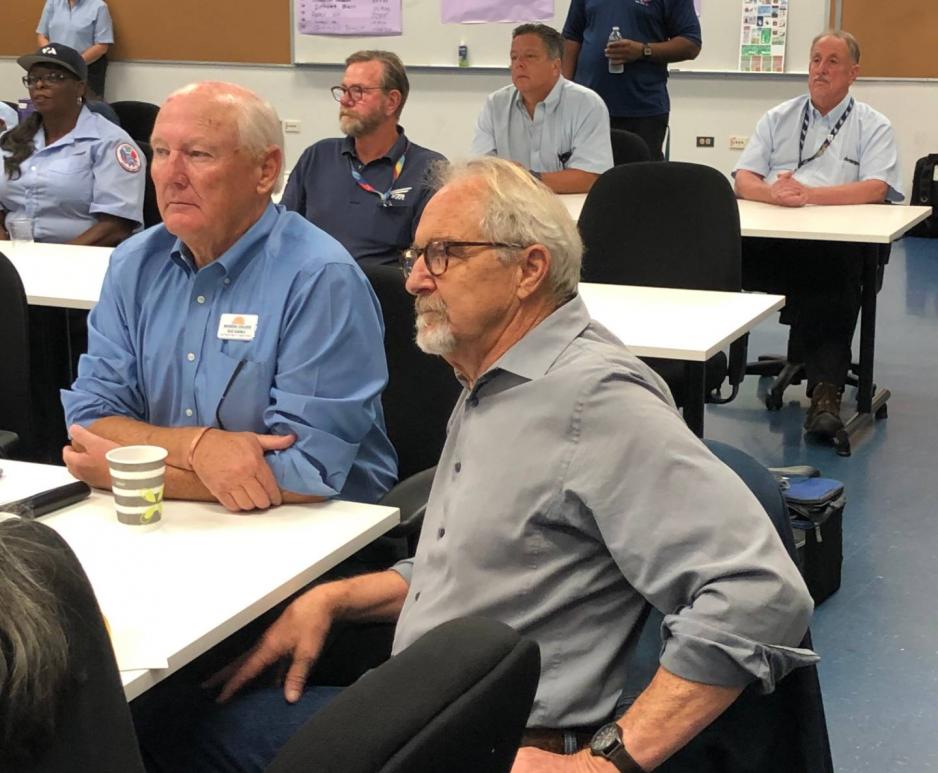Strengthening the voice transit workers have at their agencies is a top priority for International President of the Amalgamated Transit Union (ATU) John Costa. When he heard that the Santa Clara Valley Transportation Authority (VTA) and ATU Local 265 had a successful formula for that concept, he decided to make the three thousand mile trip from Washington, D.C. to San Jose to learn the secret to the success.
What Costa may not have expected to find was the strong relationship between management and labor created through the Joint Workforce Investment program (JWI.)
“I’m glad to see the pride here in how you work together,” Costa told a gathering of the VTA/ATU program participants who came together to provide Costa with a full view of how the program functions. “This is good stuff, working together.”
The JWI program is a labor/management partnership that provides mentors, apprenticeships, college credit, and in many cases, career advancement, for incoming and current VTA Operations employees, including bus and light rail operators, mechanics, and light rail overhead line and track workers. It’s become a national model for improving the working conditions of transit workers, and it was the brainchild of now-retired bus operator and ATU member Tom Fink.
“When I came to ATU with this proposal, (15 years ago) I was riding on my reputation as a driver and a member of the ATU (Local 265) Executive Board,” said Fink, who drove a VTA bus for 25 years. “And I said we were in a predicament with what it takes to train and mentor operators on the street.”
Fink described the kind of stress front line transit workers, like bus operators, experience navigating a multi-ton bus safely through traffic while dealing with some riders who can at times be less than respectful, or even outright abusive. Such conditions can, and do, drive operators away from these jobs, and Fink wanted to figure out a way to keep that from happening. He knew the union couldn’t do it alone, and management, by themselves, hadn’t been able to find the secret to success either. But coming together to tackle the issues soon made all the difference.
“The common ground,” said Fink, “was that we were both concerned about serving the public.”
ATU brought in a third party facilitator, Deb Moy, of California Transit Works!, a consortium focused on transit workforce development, to draw the two sides together to create the program. Moy started doing “focus groups” among workers to see what issues needed to be addressed in order for them to maintain healthy, successful careers. She nurtured management to address those concerns and both sides agreed to commit to honest, open communication to improve the working environment.
What started out pairing up new operators with more experienced “mentors” whom they could confide in and learn from, grew into a first-in-the-nation, full-fledged, state-certified apprenticeship program for multiple VTA transit professions. Mission College now offers up to 18 college credits to program participants, and the California Labor Federation and the U.S. Department of Labor are sources of financial support. What makes this program work is equal leadership on both sides, said Moy. “You’re here for a common purpose and that theme is carried through the program,” she said.
Lisa Vickery, now a Transportation Superintendent in charge of VTA’s Chaboya Bus Yard, helped get the program off the ground on the management side as a newly minted supervisor. “Being able to build trust and speak honestly, our compromise is that we can look at a problem from two completely different perspectives, but come up with a solution,” Vickery said.
VTA General Manager and CEO Nuria Fernandez started at VTA after the program was already in full swing, but she pledged that her support of it will continue. “We are here because we’re serving others,” Fernandez told the gathering, “and that’s one of the reasons our apprenticeship program is so important. Through this program, we can help each other be better.”
ATU International President John Costa was impressed enough that he wants to help integrate the concept into the ATU International training program, and encourage other ATU locals to bring it to their transit agencies.
“We’re going to try to encourage other locals to do the same because it’s benefitted the workers’ voice,” said Costa. “We’ve seen the success here and we want to push that to other agencies.”

